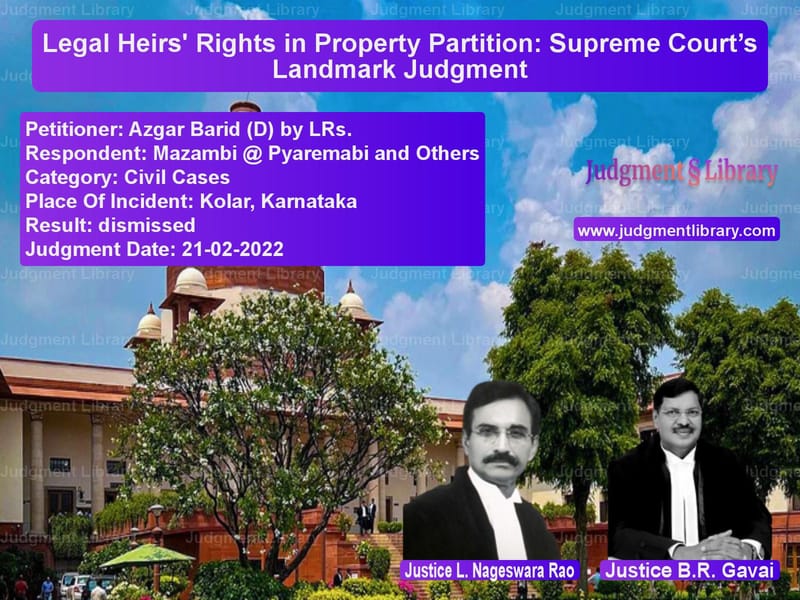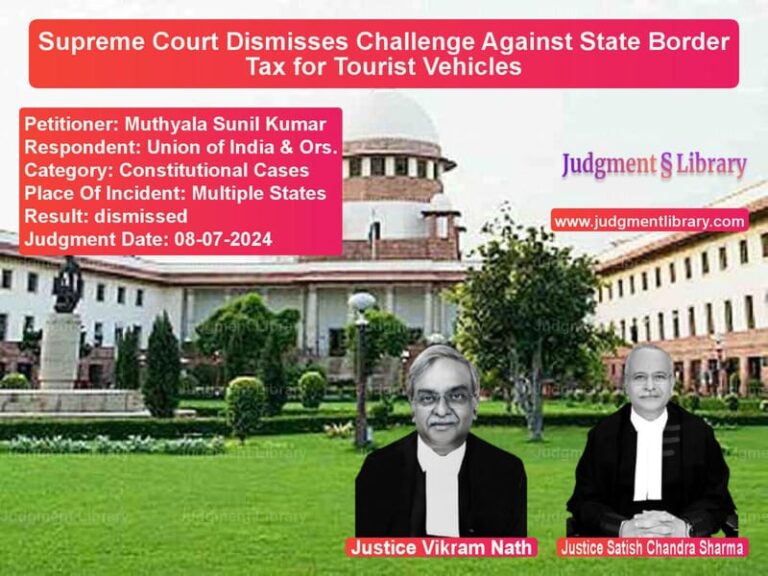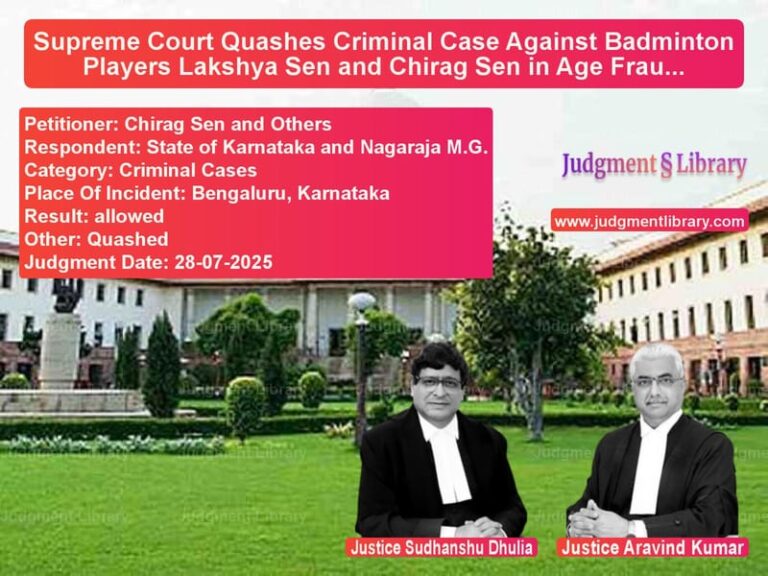Legal Heirs’ Rights in Property Partition: Supreme Court’s Landmark Judgment
The Supreme Court, in Azgar Barid (D) by LRs. vs. Mazambi @ Pyaremabi and Others, ruled on a significant dispute concerning inheritance rights and property partition under Muslim personal law. The case dealt with the entitlement of heirs, the validity of a Mehar Deed, and the principles governing partition suits.
Background of the Case
The case originated from a partition suit (O.S. No. 388/77) filed by the respondents before the Principal Munshiff at Kolar, Karnataka, seeking partition and separate possession of the suit properties. The trial court partially decreed the suit, granting shares to some plaintiffs while denying claims over certain property items.
On appeal, the First Appellate Court overturned the trial court’s decision, dismissing the partition claims. However, the Karnataka High Court reinstated the trial court’s judgment, leading to an appeal before the Supreme Court.
Arguments by the Parties
Petitioner’s Arguments (Azgar Barid’s Legal Representatives)
- The trial court’s decree had been limited to certain plaintiffs. Since some plaintiffs did not appeal, their claims should be considered abandoned.
- The High Court framed questions that were factual rather than legal, violating the scope of a second appeal under Section 100 of the Code of Civil Procedure.
- The Mehar Deed executed by Mohiyuddin Pasha in favor of his first wife Noorbi in 1936 should be considered valid, making those properties unavailable for partition.
- The First Appellate Court had rightly negated the claim of certain plaintiffs due to the lack of documentary proof of their relationship with the deceased.
Respondent’s Arguments (Mazambi @ Pyaremabi and Others)
- The High Court correctly held that all heirs should be considered plaintiffs in a partition suit, even if they had not individually appealed.
- The First Appellate Court’s ruling was based on conjecture and ignored crucial documentary and oral evidence proving their legal heirship.
- The Mehar Deed was merely a nominal transaction meant to avoid the claims of other heirs and was never actually enforced.
Supreme Court’s Key Observations
1. Role of Legal Heirs in Partition Suits
The Court emphasized that all legal heirs in a partition suit should be treated equally, regardless of who initiated the claim:
“In a partition suit, the position of the plaintiff and defendant can be interchangeable. Each party adopts the same position as the other parties, and as long as the suit is pending, a defendant can ask to be transposed as a plaintiff and vice versa.”
2. Rejection of the Mehar Deed Claim
The Court found that the Mehar Deed in favor of Noorbi was never implemented and was merely a nominal document to avoid inheritance claims:
“The Mehar Deed was created with a view to avoid the share of the first son, Rahaman Barid. The evidence from earlier proceedings clearly shows that it was not acted upon.”
3. Validity of High Court’s Interference
The Supreme Court justified the High Court’s intervention in the appellate ruling, noting that the First Appellate Court had ignored material evidence:
“The High Court’s findings were based on sound reasoning. The First Appellate Court had failed to consider voluminous oral and documentary evidence proving the relationship of plaintiffs 4 to 8 with Mohiyuddin Pasha.”
4. Legal Status of Widows and Daughters
The Court ruled that the widow and daughter of Rahaman Barid, who predeceased the propositus (Mohiyuddin Pasha), were not entitled to inheritance:
“Since Rahaman Barid died before his father, his wife and daughter were not entitled to a share in the suit schedule properties.”
Final Judgment
The Supreme Court upheld the High Court’s ruling, dismissing the appeal:
- The High Court’s division of property among heirs was confirmed.
- The Mehar Deed claim was rejected.
- Claims of legal heirs were upheld, while predeceased heirs’ descendants were denied a share.
- The appeal was dismissed without costs.
Impact of the Judgment
This ruling has far-reaching implications for inheritance law:
- Clarifies heirship under Muslim law: Legal heirs can claim partition, but descendants of predeceased heirs may not be entitled to a share.
- Reinforces the importance of evidence: Documentary proof is essential in inheritance claims.
- Protects against fraudulent transactions: Nominal Mehar Deeds cannot be used to defeat legitimate inheritance rights.
- Strengthens partition suit principles: All parties in a partition suit should be treated equally, even if they do not individually appeal.
The Supreme Court’s judgment provides a definitive interpretation of inheritance disputes and ensures fair distribution of ancestral properties based on legal heirship.
Petitioner Name: Azgar Barid (D) by LRs..Respondent Name: Mazambi @ Pyaremabi and Others.Judgment By: Justice L. Nageswara Rao, Justice B.R. Gavai.Place Of Incident: Kolar, Karnataka.Judgment Date: 21-02-2022.
Don’t miss out on the full details! Download the complete judgment in PDF format below and gain valuable insights instantly!
Download Judgment: azgar-barid-(d)-by-l-vs-mazambi-@-pyaremabi-supreme-court-of-india-judgment-dated-21-02-2022.pdf
Directly Download Judgment: Directly download this Judgment
See all petitions in Property Disputes
See all petitions in Succession and Wills
See all petitions in Judgment by L. Nageswara Rao
See all petitions in Judgment by B R Gavai
See all petitions in dismissed
See all petitions in supreme court of India judgments February 2022
See all petitions in 2022 judgments
See all posts in Civil Cases Category
See all allowed petitions in Civil Cases Category
See all Dismissed petitions in Civil Cases Category
See all partially allowed petitions in Civil Cases Category







